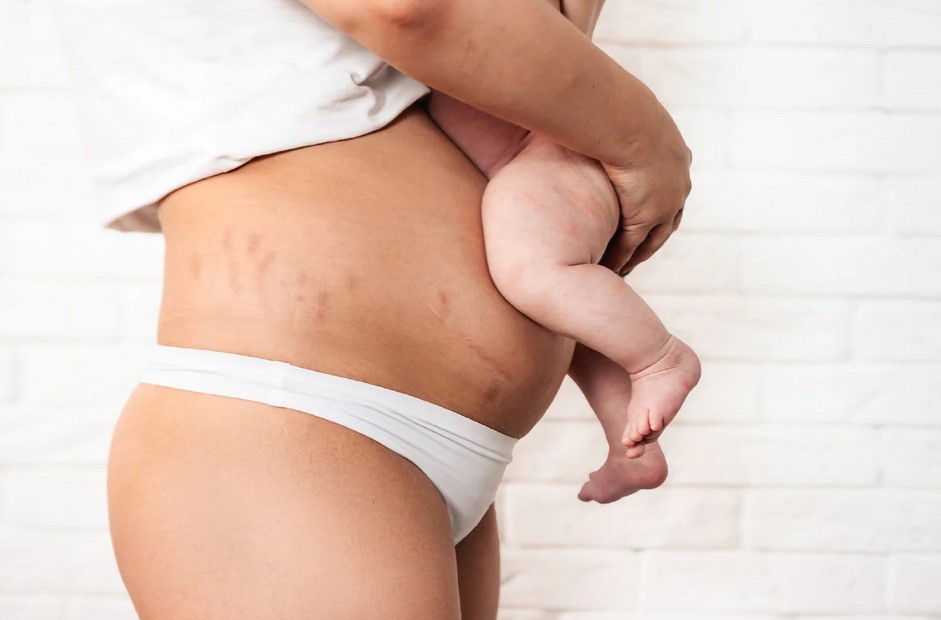The postpartum body is not just a phase but a new state of normal where the body after pregnancy seeks to recover and stabilize. Hormonal shifts, physical healing, and emotional dynamics play a significant role during this period. These changes can affect everything from physical appearance to mental health, making it essential for mothers to approach this time with knowledge and compassion for themselves.
During the weeks and months following delivery, the body works to heal tissues and return organs to their pre-pregnancy state. This includes the shrinking of the uterus, the reduction of extra fluid, and changes in body composition. It’s a time marked by both resilience and vulnerability as the body recovers from childbirth and adjusts to the demands of parenting.
This introduction sets the stage for a deeper exploration of the postpartum body, highlighting the need for support and understanding of the natural processes at work. As we delve further into the topic, we will explore specific physical and emotional changes, offering real-life tips and expert advice to support mothers through their postpartum journey. This understanding not only aids in physical recovery but also supports mental and emotional well-being, pivotal for embracing motherhood with confidence and health.

Physical Changes After Childbirth
After the joy of childbirth, many women experience a range of physical changes as their bodies begin to recover. Understanding these changes can help manage expectations and guide new mothers through their recovery process more smoothly.
One of the most immediate changes is hormonal adjustments. The sharp drop in hormones like estrogen and progesterone after delivery can affect everything from mood to physical recovery. This hormonal fluctuation is also responsible for postpartum symptoms such as night sweats and changes in skin condition.
Another significant change is the reduction in uterine size. Immediately after childbirth, the uterus begins to contract and shrink back to its pre-pregnancy size. This process, known as involution, can take six to eight weeks and is often accompanied by postpartum bleeding or ‘lochia’. The contraction of the uterus is crucial for reducing blood loss post-delivery.
Skin changes are also notable during the postpartum period. Many women notice stretch marks, which are typically purple or red lines that may gradually fade to a lighter shade. Changes in skin elasticity and pigment, often referred to as the ‘mask of pregnancy’ or melasma, can persist after pregnancy but usually lessen over time.
The post-pregnancy body also undergoes changes in metabolism and weight distribution, which can impact physical appearance and function. Abdominal muscles that have stretched or separated during pregnancy, a condition known as diastasis recti, may need targeted exercises for recovery.
By understanding these typical physical changes, new mothers can better prepare for the recovery phase, ensuring they manage their health effectively while adapting to life with their new baby.
Emotional and Psychological Adjustments After Childbirth
After giving birth, many women experience a range of emotional and psychological changes that are as significant as the physical transformation of the postpartum body. This period can bring about feelings commonly referred to as the ‘baby blues,’ which typically include mood swings, sadness, irritability, and anxiety that generally resolve within two weeks without medical intervention. However, for some, these symptoms may deepen and persist, evolving into a more severe condition known as postpartum depression.
Understanding and recognizing the symptoms of both the baby blues and postpartum depression is crucial. Symptoms of postpartum depression can include severe mood swings, excessive crying, difficulties in bonding with the baby, withdrawal from family and friends, loss of appetite, overwhelming fatigue, and a lack of joy in life. These signs demand more significant attention and often require professional treatment, including therapy and medication.
Emotional support from partners, family, and friends plays a pivotal role in the recovery and mental health of new mothers. It is essential for those around new mothers to offer support and encourage them to seek help if symptoms of depression arise. Creating a supportive environment can help mothers navigate these challenges more smoothly and ensures they do not feel alone in their experiences. This support is not just beneficial but necessary for fostering a healthy recovery and bonding experience with the new baby.

Healing and Recovery in the Postpartum Period
After childbirth, the body enters a crucial healing phase, whether the delivery was vaginal or via cesarean section. Each type of delivery comes with its specific recovery processes and timelines that are important to understand to ensure a smooth transition during this delicate period.
Vaginal Delivery Recovery: The recovery from a vaginal birth generally involves less physical trauma than a cesarean, but it still requires careful attention. The post pregnancy body needs time to heal from any tearing or episiotomy. Most women start to feel significantly better by the sixth week, with gradual improvement each day. Key activities include pelvic floor exercises to strengthen muscles and gentle walking to boost circulation.
Cesarean Section Recovery: Recovery from a cesarean delivery, considered major abdominal surgery, often takes longer. The initial healing of the incision typically takes about two to six weeks, during which activities need to be very gentle and lifting should be minimal to avoid straining the incision site. Keeping the incision clean and monitoring for signs of infection are crucial.
General Care Tips:
- Rest: Getting enough rest is key, though challenging, with a newborn. Whenever possible, sleep when the baby sleeps.
- Nutrition: Eating a balanced diet rich in vitamins, minerals, and protein supports tissue repair and overall recovery.
- Hydration: Staying hydrated, especially if breastfeeding, is important for maintaining good health during the recovery phase.
When to Seek Medical Attention:
- Signs of infection such as fever, increasing pain, or discharge from the incision or vaginal area.
- Heavy bleeding or worsening pain.
- Any concerns about healing, especially around stitches or the cesarean incision.
Understanding these aspects of recovery can help manage expectations and prepare for the postpartum journey, making it as smooth as possible for the new mother. It’s important to maintain regular check-ups and communicate openly with healthcare providers about any concerns during the recovery period.
Nutrition and Exercise After Pregnancy
After childbirth, maintaining a balanced diet is essential for recovery and hormonal regulation. Incorporating a variety of nutrients helps restore the body after pregnancy and supports overall health. Focus on foods rich in iron to replenish blood loss, calcium to strengthen bones, and omega-3 fatty acids to aid in hormonal balance and mental health. Prioritize whole grains, lean proteins, and plenty of fruits and vegetables to provide sustained energy and facilitate healing.
Gentle exercises play a crucial role in strengthening the post partum body. Start with low-impact activities such as walking, pelvic floor exercises, and stretching. These can help enhance circulation, improve mood, and gradually rebuild muscle strength without overstraining. Always consult with a healthcare provider before beginning any exercise routine postpartum to ensure it aligns with your specific recovery needs.
Embracing Your Journey Through Motherhood
Understanding and nurturing the postpartum body is a pivotal step in embracing the journey of motherhood. The weeks and months following childbirth are a time of profound change and adaptation, where caring for your body is as crucial as caring for your newborn. Recognizing the transformations that occur in the post partum body is essential not only for physical recovery but also for mental well-being.
New mothers are encouraged to be patient with their bodies and acknowledge that recovery and adjustment take time. Every woman’s journey is unique, and thus, personalized advice from healthcare providers is invaluable. Consulting with medical professionals can provide tailored strategies that support both physical and emotional health during this transformative phase.
As you navigate the postpartum period, remember that seeking help and guidance is a sign of strength, not a weakness. Healthcare providers can offer resources and interventions if challenges like postpartum depression or physical complications arise. By staying informed and proactive about postpartum care, new mothers can foster resilience, promote healing, and fully enjoy the early stages of motherhood with confidence and support.
Leave a Reply